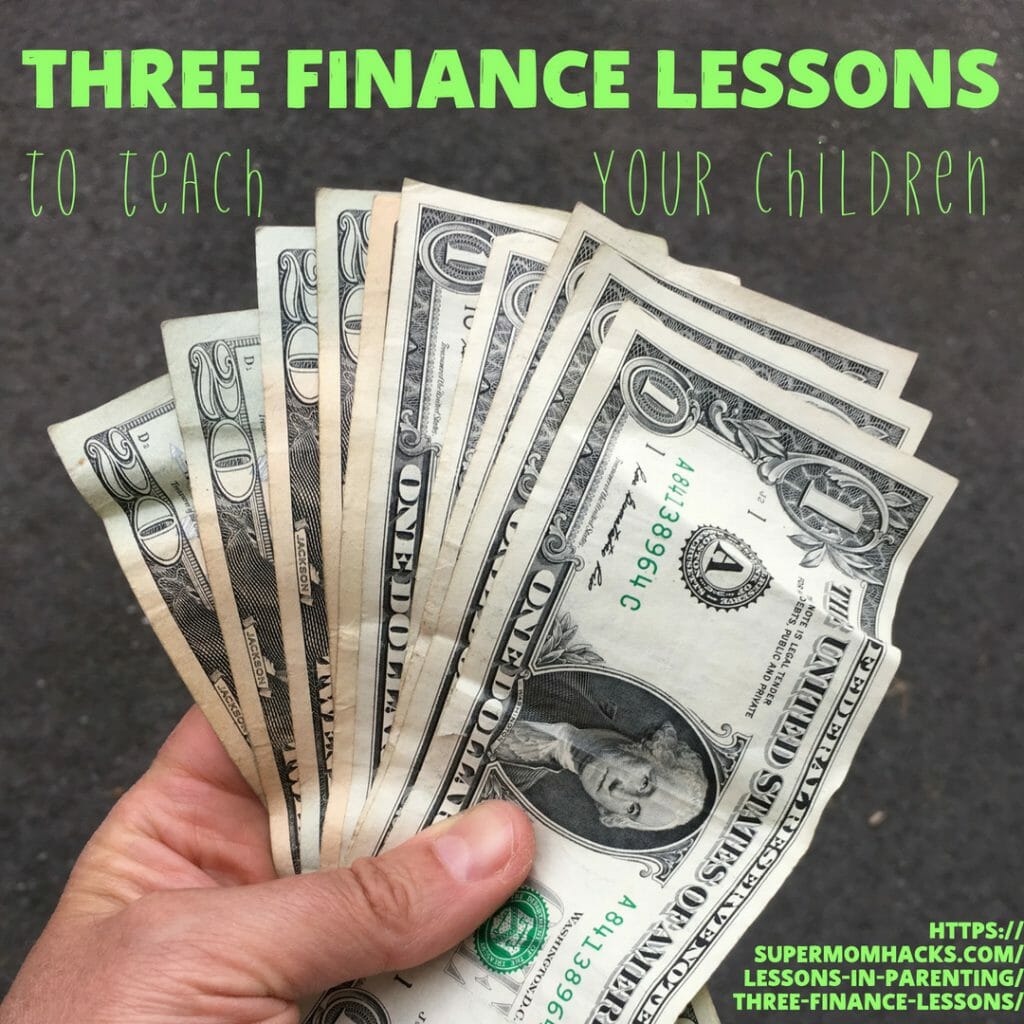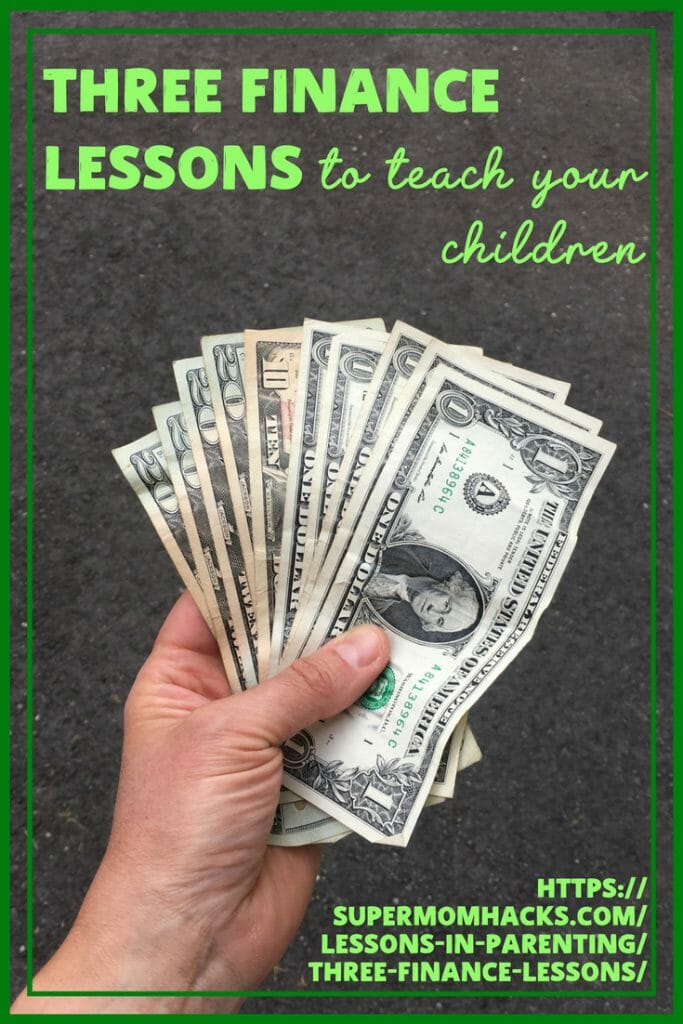I’m thrilled to share this guest post today from fellow blogger Sarah Brumley! Sarah is one of my blogging sisters – I swear, half of what she writes makes me think, “I can hear myself saying that to my kids!” (The other half, I wish I had already thought of saying to my kids!) While I haven’t read a post of hers that I DON’T like, I’m especially fond of her organizational tips for the home, and her wise words on personal and family finance. Thus I could think of no one better to write a post on hacks for teaching finance lessons to your children. I hope you love her common-sense, down-to-earth tips as much as I do!
Three Finance Lessons All Children Should Learn
We didn’t talk a lot about money growing up. I didn’t receive an allowance the way many kids did, but rather, my parents took care of all of the necessities, and provided a little spending money when I needed it. In high school, I took on a waitressing job and I always seemed to have enough money to take care of any needs and wants I had.
When I got to my twenties, though, I did what a lot of young adults do: I got a credit card, took on a lot of student loan debt, and didn’t save a penny. It was eye opening when I finally realized what I needed to do to get my finances in order.
I’m well aware that we cannot control how our children will choose to deal with their finances in the future. What they learn now, though, will lay a foundation that they can return to in the future, if and when they decide to manage their finances responsibly. Of course, there are so many different facets of finance that can be learned, so my suggestion is to start with the following.

1. To make money, you must work for it.
I’m sure you don’t head out the door every day to go to a job that requires nothing of you. In fact, I bet there are many times you return home stressed because of all the things that still need to be done at your place of employment. While kids don’t necessarily need to understand that level of stress, they should be aware that money doesn’t grow on trees and doesn’t come as a free handout.
Helping your children to understand this concept can be difficult when birthday cards include enough cash to keep them in toys until Christmas, but it can be taught in a couple of ways.
Everyone contributes around the home
There’s a lot of discussion regarding the pros and cons of giving your child an allowance tied to doing household chores. While I recognize it doesn’t work for many children, I want mine to understand that everyone contributes to maintain our home. Just because they live here does not mean that they will get a free ride.
Is household work fun?
No, it’s not.
In fact, I’ve had this discussion with my own daughters just recently, and we came to the conclusion that if everyone is going to live in the home, then everyone gets to contribute. Dad goes to work to make money to pay for the home, so he doesn’t spend as much time maintaining it by doing household chores. Mom works from home so, while she is making money to pay for groceries and such, she also prioritizes making sure that the house stays organized and clean. Kids who are not contributing financially but are still reaping the rewards of a warm bed, clean sheets, and home cooked meals, should participate by completing household tasks.
If you have older kids – they might start to groan about doing chores, and that’s okay. I let my family know if they wanted to trade chores for paying rent to live in our home, I’d be fine with that. They quickly realized the problem: in order to pay rent, they’d have to go get a job outside of the house, and possibly work harder than they would just to do their chore here.
Teach your children to do their tasks without groaning and complaining, and to get those tasks done well, and that will be something that will stick with them as they move into life in “the real world”.
How:
Assign rotating chores or “tasks” around the home for each child to participate in. While you can tie it to privileges, I highly recommend having some sort of monetary arrangement so that your child begins to understand that money only comes when you work for it.
When your child needs more money than what they have in their pocket, allow him or her to work for additional money doing tasks above and beyond their normally assigned chores. This could be mowing the lawn, cleaning windows, mopping floors, or whatever else needs to get done that day.
2. Prioritize spending
Ever handed a ten-year-old five dollars to put in their purse and then waited a week to go anywhere she might have a chance to spend it? I’m guessing you had a squirmy child, constantly asking when the next trip to the grocery store was going to happen, whether you needed to go to Walmart any time soon, or were you heading to the mall.
I tried it with my daughter this past week and that money has seriously been burning a hole in her pocket. The thing is – she really doesn’t have anything she wants or needs, but she knows that she has money to spend and can’t wait to do so.
Helping our children learn to prioritize their spending is important. Even as adults, we know that an unexpected amount of money gracing our wallets or bank accounts can lead to the temptation of spending it, even on unnecessary things.
So how do we help our children learn how to save their money for the things that really matter?
Let them spend it
We allow them to spend their money on the things they want, with a careful reminder that they might prefer to save it for something bigger. In our case, my girls will spend all of their money on gum, just because we make it to the grocery store more often than the toy store. Then, when they do get the opportunity to hit up the toy store, they have no money left.
It’s a hard lesson for a child to learn, but it’s so important that they recognize that, by spending their money on something they didn’t really need, they will miss out on those things that they really want down the line.
Don’t bail them out
Whatever you do, don’t bail your child out when their eyes start to well up in the toy store. Instead, calmly remind them about the money they had and what they spent it on. This might be a lesson you have to learn with your child, but if you’ve given your child a warning about spending all their money on something they didn’t really need, then you cannot bail them out when they realize they don’t have enough money for that thing they really wanted.
When you choose to give them that money, they begin to expect that money will just show up when they need it and won’t see the value in saving or earning money in the future.
3. Debt might be easy, but it’s not fun
Of course, if you want to allow your child to purchase that item they don’t have enough money for, then it’s a great time to teach them about debt. Talk to them about credit and what that looks like. They can have credit with you for that item, but then every bit of money they receive needs to go to you (making them uncomfortable) until they have paid down that debt.
Hopefully, it won’t be a fun thing for your child to be in debt and might help them avoid it in the future. In fact, you may even be able to talk to them about how you use debt yourself (if you do). Show they that you might swipe that credit card in the store, but then educate them on the process that happens after: you receive a bill, you have to pay it back, and it comes with interest.
Swiping a credit card looks like fun to a child if they don’t understand how debt works. If you don’t believe so, ask any college student that’s just maxed out their first card.
It starts early
Whatever method you use to address finances with your child, make sure you start early. You (and they) will be happy you did!
Are you teaching your children about finances? Leave a comment below and let me know how (and what!) you are teaching them!
Love,
Sarah
If you enjoyed this post on finance lessons children should learn, why not share it with others by pinning this image?

 ABOUT THE AUTHOR: Sarah Brumley is a writer and educator with a desire to provide everyday families with practical tools and strategies for simplifying their family lives. Her website, Lemon Blessings, is a family-oriented blog with a focus on budgeting, goal setting, saving, debt management, household, and family life. When she’s not writing, Sarah enjoys spending time with her husband, pre-teen daughters, and three cats. Sarah can always be found on Twitter or you can track her down on her blog at lemonblessings.com.
ABOUT THE AUTHOR: Sarah Brumley is a writer and educator with a desire to provide everyday families with practical tools and strategies for simplifying their family lives. Her website, Lemon Blessings, is a family-oriented blog with a focus on budgeting, goal setting, saving, debt management, household, and family life. When she’s not writing, Sarah enjoys spending time with her husband, pre-teen daughters, and three cats. Sarah can always be found on Twitter or you can track her down on her blog at lemonblessings.com.
NOTE: This site contains affiliate links. I may earn a small commission from any purchases made through affiliate links, at no additional cost to you. For more information, please read the full disclosure/privacy policy.


Pingback: Invest In Your Family’s Financial Future With Passive Revenue Streams - Super Mom Hacks
Wonderful tips.
Something that we have done with our children in their teen years is to have them manage the house hold finances for six months. With everything electronic and plastic it is hard for them to comprehend the household expenses.
I LOVE this idea!!! We’re starting to offer our 8-year-old the “option” of paying rent or contributing to the mortgage when she gets all territorial about her room and her “space.” An exercise like what you describe would be excellent preparation for life beyond At Home Growing Up!
Elaine that is a fantastic idea! I’d love to implement that strategy in my own home when my kids get a little older. They are already on the right track with meal planning and watching our grocery budget, so I can see this playing out well!
Yes, these are all so important. We have been teaching our son about the importance of money and other financial advice lately. Some people think we are crazy since he is only 11, but I think the sooner we can pass this information on, the better.
ONLY eleven? I’ve been working on this with my girls since they were four! So, no, you’re not at all crazy! – you are totally right about this!
It’s never to early to start kids learning about finances! The sooner they learn good habits, the better – definitely!
I dont have kids, but I know my parents taught me well. Being able to save, spend and learn from mistakes is key x
Absolutely! You are fortunate your parents taught you these things. Mine did as well, thank goodness, but it’s all too rare…
What a blessing to have parents that taught you well! It can be such a detriment to kids to grow up and not know how to manage their finances! (I learned every thing the hard way!)
Yes to all of this! I acquired student loans in grad school and they still haunt me. I am very open with my kids about money. Not to create anxiety, but to teach them. They don’t want to save, but they will be happy they did in 20 years.
Ohhhhhh yes. I worked my way through grad school and whenever I was going to be short on money, I took on another job for that semester. My grad school roommate took out another loan instead (on top of her loans from undergrad – I don’t think she worked at all in undergrad, but by senior year I was up to 40+ hours a week between 3 jobs). I finished grad school debt free. She finished with over $50K in student loans that she is still paying off.
We are still working on paying off our student loan debt. It’s such a terrible trap to end up with and, like you, I don’t teach my kids about finances to make them worry, but to equip them for better choices in the future!
Money and finance has always been a struggle for me; even now! These tips are actually helpful for people like me who may be autistic or have other barriers which prevent them from being able to deal with finance like most people. Great advice, I’m sure lots of new parents will find this helpful.
So glad you liked them, Jazmin, and that they were helpful for you/others on the spectrum as well! That is a really good point that I hadn’t thought of, so am SO glad you found this to be the case! 🙂
I’m so glad you found this helpful, Jazmin. My daughter is autistic and I find that while she doesn’t understand all of the concepts all of the time, she does learn incrementally, so approaching these ideas with her from an early age has made a huge difference! Don’t hesitate to reach out if you ever need help!
I think this starting-early, incremental approach works best in SO many areas of life, and not just for kids with learning differences!
These tips are so spot on! Totally bookmarking for when I have kids! I used to love spending my money I saved on a new toy when I was a kid!
So glad you liked Sarah’s excellent tips! 🙂
My kids love spending their money on toys, but I’ve noticed a bit more lately that they are more apt to save it until they find something they really love! It’s nice to see them making the connection that saving in the short-term can be better for the long-term.
Oh dear – my youngest is currently obsessed with saving $5 so she can buy her very own box of Girl Scout cookies to savor!
Right on the money. I went to college in my adult years and took finance classes. Really wish they would mandate these type of classes in public schools. This post is an excellent start for children. Well done!
You’re more than welcome! I LOVE these great tips from Sarah!
These are excellent tips! I see my own daughter and son-in-law practicing this strategy with their own 3 young daughters. When the girls do earn money or have some given to them, they are allowed to keep some and the rest goes into their savings accounts.
My daughter also has the chore charts and the girls understand they have responsibilities and opportunities to earn some kind of rewards, which may or may not be money. My daughter also sets spending limits when she lets the girls pick something out, such as on Amazon, and in the process, teaches them some basic math skills.
Yes to all of this! I LOVE practicing math skills with my daughters whenever they want to buy something!!!
These are great tips! We started a piggy bank when my son was three and would give him quarters or dimes for little jobs around the house and it was such a great way to start teaching him – he has yet to want to spend it though haha
Oh what a great way to get him started! That is fabulous!
This is a great post I definitely want my kids to learn these lessons it definitely helps them as they become adults.
SO true!
Thank you for sharing. This definitely valuable tips. My son isn’t quite old enough to understand debt and all that jazz .. when is it appropriate to give toddlers chores? Lol, he’s five. 🙂
Even toddlers can do chores! I put mine to work “helping” fold laundry at that age – they are naturally wanting to help anyway, so I figured why not capitalize on it? And you’re right, they don’t quite get “debt” when they are five, but as soon as that first tooth comes out, they are aware of money (assuming you’re in a country where the Tooth Fairy trades that tooth for cash) – never too early to start! 🙂
Such a great post, this is a really important topic to teach our kids but I feel that so many people do not do this. In not teaching them lessons like this, I feel they really aren’t prepared for dealing with money as adults.
I can’t agree with you more – well said!
I think these are all really important lessons for kids. We make our 7 year old ‘earn’ her money.
Good for you – you’re ahead of the game! 🙂
These are great tips – I’ve always tried to make my daughter realise the value of money and that she needs to earn it in order to be able to spend it… it’s so important that she learns this at a young age in order to avoid getting into debt later on in life!
Absolutely – you are so right, Mama!
Great tips, reminds me of a recent experience i had with my 5 year old. she earned $5 from her uncle for doing yard work with him, and wanted to spend it on the ice cream truck. The cheapest ice cream that is carried by the truck is $3. i drew her out a picture (horribly since my stick figures look deformed, i am no artist) and showed her that $5 at the ice cream truck is 1 ice cream MAYBE 2 tops, if she found another dollar. or i can take her to the dollar store and she can buy 5 ice creams instead. i felt proud when she decided the latter. educating kids on money and getting the biggest bang for their buck without encouraging overspending or incruing debts is a valuable life long lesson
Good for her! (and for you, Mama, for taking the time to walk her through her choices!) 🙂
These are such valuable life lessons. We are pretty open in our home about money. My folks were not. They never spoke about it at all. I wish they had been more open.
Then you know firsthand how important these lessons can be!
So many people don’t know how to manage their money and I think it’s because they aren’t taught enough. My boys have a chore chart. There are “above the line” chores that have to be done as part of the household, and “below the line” chores that they can get paid for. We don’t make them do those, but they don’t get paid.
I LOVE this idea of a dual-track chore chart – we may have to try this! My bro and I both knew, growing up in the path of a glacier 10,000 years ago (which dumped a ton of rocks on the ground that my father gardened) that whenever we wanted to earn extra $$$, all we had to do was go pick rocks out of the garden and Dad would pay us!
I don’t think REAL LIFE is taught in school ENOUGH! There is so much I learned in school that I do not remember AT ALL these days – however, I never learned much about… Um, BANKING and such when I was in school, which would have been way more useful!
So true!!!
Great tips! My kids aren’t at this age yet, but I know it’s coming. I will definitely keep this advice in mind.
You’re welcome! 🙂
SO funny, my pastor said that most millennials are racking up debt and simply paying the minimum payment and just living IN debt. Crazy huh? I wasn’t too surprised tho because of this very article and people not instructing their children. I know I wasn’t… that’s why I blog for those moms that didn’t get training they needed. My husband and I are debt-free but that’s not easy street either.
I remember being in Mexico once (in my 20s with my brother and mother, after my dad had died and before bro or I had married) and talking to someone who assumed that because we were Americans, we were in debt up to our eyeballs. He was floored to learn that we had zero car payments, zero credit card debt – no debt whatsoever except for my bro and I each having a condo with a mortgage. He called over a bunch of his friends to introduce them to us because they had NEVER met Americans who weren’t in piles of debt. Humbling experience. And no, delayed gratification is not easy, but not spending more than you can afford to pay off is always the better choice!
i 100% agree that kids need to learn young how to manage finances – i never learned and it really affected me later on.
So true. So many of the troubles many of us get ourselves into, could be avoided if we all learned more of this from our parents.